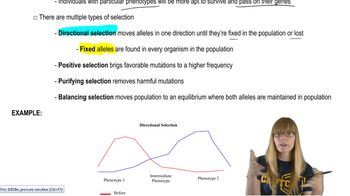Here are the essential concepts you must grasp in order to answer the question correctly.
Mutation
Mutation refers to changes in the DNA sequence of an organism's genome. These alterations can occur spontaneously or be induced by environmental factors, such as exposure to antibiotics. In bacteria, mutations can lead to traits that confer resistance to antibiotics, allowing those bacteria to survive and reproduce in the presence of these drugs.
Recommended video:
Natural Selection
Natural selection is the process by which organisms better adapted to their environment tend to survive and produce more offspring. In the context of antibiotic resistance, when antibiotics are used, susceptible bacteria are killed, while those with mutations that confer resistance survive. Over time, these resistant bacteria become more prevalent in the population, leading to a higher overall level of resistance.
Recommended video:
Antibiotic Resistance
Antibiotic resistance occurs when bacteria evolve mechanisms to withstand the effects of drugs that once killed them or inhibited their growth. This phenomenon is a significant public health concern, as it can lead to treatment failures and the spread of resistant infections. Understanding the roles of mutation and natural selection is crucial for addressing and mitigating the impact of antibiotic resistance.
Recommended video:






